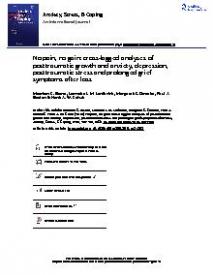No pain, no gain : cross-lagged analyses of posttraumatic growth and anxiety, depression, posttraumatic stress and prolonged grief symptoms after loss
Background and objectives: Major negative life-events including bereavement can precipitate perceived positive life-changes, termed posttraumatic growth (PTG). While traditionally considered an adaptive phenomenon, it has been suggested that PTG represents a maladaptive coping response similar to cognitive avoidance. To clarify the function of PTG, it is crucial to establish concurrent and longitudinal associations of PTG with post-event mental health problems. Yet, longitudinal studies on this topic are scarce. The present study fills this gap in knowledge.
Design: A two-wave longitudinal survey was conducted.
Methods: Four-hundred and twelve bereaved adults (87.6% women) filled out scales assessing PTG and symptoms of depression, anxiety, prolonged grief, and posttraumatic stress at baseline and 6 months later.
Results: The baseline concurrent relationships between all symptom levels and PTG were curvilinear (inverted U-shape). Cross-lagged analyses demonstrated that symptom levels did not predict levels of PTG 6 months later, or vice versa.
Conclusions: Findings suggest PTG after loss has no substantive negative or positive effects on mental health. Development of specific treatments to increase PTG after bereavement therefore appears premature.
In: Anxiety, Stress, & Coping : An International Journal ISSN: 1477-2205 | 32 | 3 | 231-243
https://www.tandfonline.com/doi/pdf/10.1080/10615806.2019.1584293
Open Access


